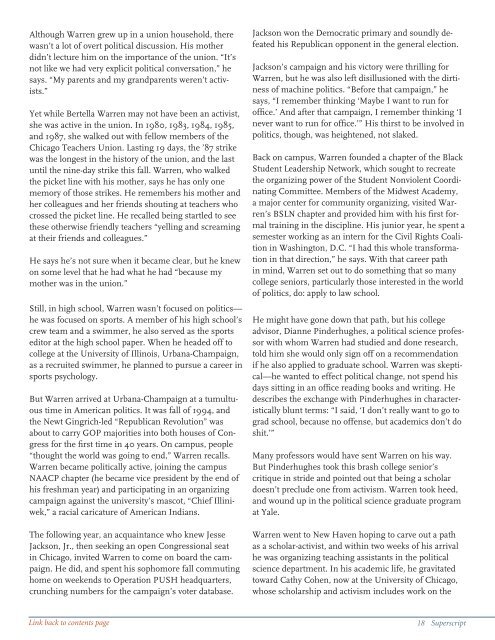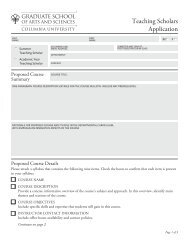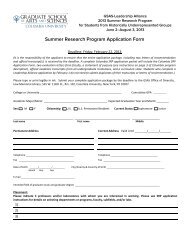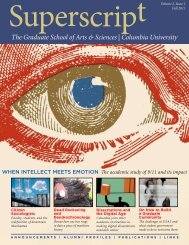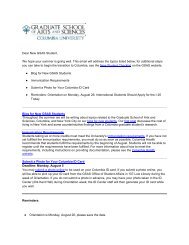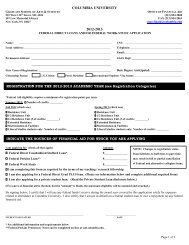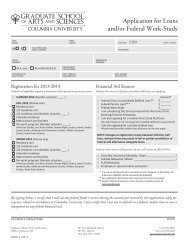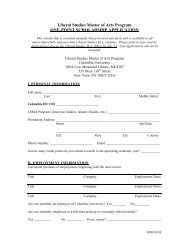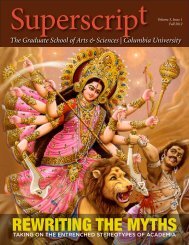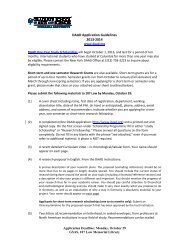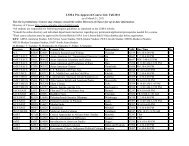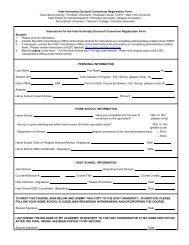PDF for Printing - Graduate School of Arts and Sciences - Columbia ...
PDF for Printing - Graduate School of Arts and Sciences - Columbia ...
PDF for Printing - Graduate School of Arts and Sciences - Columbia ...
- No tags were found...
You also want an ePaper? Increase the reach of your titles
YUMPU automatically turns print PDFs into web optimized ePapers that Google loves.
Although Warren grew up in a union household, therewasn’t a lot <strong>of</strong> overt political discussion. His motherdidn’t lecture him on the importance <strong>of</strong> the union. “It’snot like we had very explicit political conversation,” hesays. “My parents <strong>and</strong> my gr<strong>and</strong>parents weren’t activists.”Yet while Bertella Warren may not have been an activist,she was active in the union. In 1980, 1983, 1984, 1985,<strong>and</strong> 1987, she walked out with fellow members <strong>of</strong> theChicago Teachers Union. Lasting 19 days, the ’87 strikewas the longest in the history <strong>of</strong> the union, <strong>and</strong> the lastuntil the nine-day strike this fall. Warren, who walkedthe picket line with his mother, says he has only onememory <strong>of</strong> those strikes. He remembers his mother <strong>and</strong>her colleagues <strong>and</strong> her friends shouting at teachers whocrossed the picket line. He recalled being startled to seethese otherwise friendly teachers “yelling <strong>and</strong> screamingat their friends <strong>and</strong> colleagues.”He says he’s not sure when it became clear, but he knewon some level that he had what he had “because mymother was in the union.”Still, in high school, Warren wasn’t focused on politics—he was focused on sports. A member <strong>of</strong> his high school’screw team <strong>and</strong> a swimmer, he also served as the sportseditor at the high school paper. When he headed <strong>of</strong>f tocollege at the University <strong>of</strong> Illinois, Urbana-Champaign,as a recruited swimmer, he planned to pursue a career insports psychology.But Warren arrived at Urbana-Champaign at a tumultuoustime in American politics. It was fall <strong>of</strong> 1994, <strong>and</strong>the Newt Gingrich-led “Republican Revolution” wasabout to carry GOP majorities into both houses <strong>of</strong> Congress<strong>for</strong> the first time in 40 years. On campus, people“thought the world was going to end,” Warren recalls.Warren became politically active, joining the campusNAACP chapter (he became vice president by the end <strong>of</strong>his freshman year) <strong>and</strong> participating in an organizingcampaign against the university’s mascot, “Chief Illiniwek,”a racial caricature <strong>of</strong> American Indians.The following year, an acquaintance who knew JesseJackson, Jr., then seeking an open Congressional seatin Chicago, invited Warren to come on board the campaign.He did, <strong>and</strong> spent his sophomore fall commutinghome on weekends to Operation PUSH headquarters,crunching numbers <strong>for</strong> the campaign’s voter database.Jackson won the Democratic primary <strong>and</strong> soundly defeatedhis Republican opponent in the general election.Jackson’s campaign <strong>and</strong> his victory were thrilling <strong>for</strong>Warren, but he was also left disillusioned with the dirtiness<strong>of</strong> machine politics. “Be<strong>for</strong>e that campaign,” hesays, “I remember thinking ‘Maybe I want to run <strong>for</strong><strong>of</strong>fice.’ And after that campaign, I remember thinking ‘Inever want to run <strong>for</strong> <strong>of</strong>fice.’” His thirst to be involved inpolitics, though, was heightened, not slaked.Back on campus, Warren founded a chapter <strong>of</strong> the BlackStudent Leadership Network, which sought to recreatethe organizing power <strong>of</strong> the Student Nonviolent CoordinatingCommittee. Members <strong>of</strong> the Midwest Academy,a major center <strong>for</strong> community organizing, visited Warren’sBSLN chapter <strong>and</strong> provided him with his first <strong>for</strong>maltraining in the discipline. His junior year, he spent asemester working as an intern <strong>for</strong> the Civil Rights Coalitionin Washington, D.C. “I had this whole trans<strong>for</strong>mationin that direction,” he says. With that career pathin mind, Warren set out to do something that so manycollege seniors, particularly those interested in the world<strong>of</strong> politics, do: apply to law school.He might have gone down that path, but his collegeadvisor, Dianne Pinderhughes, a political science pr<strong>of</strong>essorwith whom Warren had studied <strong>and</strong> done research,told him she would only sign <strong>of</strong>f on a recommendationif he also applied to graduate school. Warren was skeptical—hewanted to effect political change, not spend hisdays sitting in an <strong>of</strong>fice reading books <strong>and</strong> writing. Hedescribes the exchange with Pinderhughes in characteristicallyblunt terms: “I said, ‘I don’t really want to go tograd school, because no <strong>of</strong>fense, but academics don’t doshit.’”Many pr<strong>of</strong>essors would have sent Warren on his way.But Pinderhughes took this brash college senior’scritique in stride <strong>and</strong> pointed out that being a scholardoesn’t preclude one from activism. Warren took heed,<strong>and</strong> wound up in the political science graduate programat Yale.Warren went to New Haven hoping to carve out a pathas a scholar-activist, <strong>and</strong> within two weeks <strong>of</strong> his arrivalhe was organizing teaching assistants in the politicalscience department. In his academic life, he gravitatedtoward Cathy Cohen, now at the University <strong>of</strong> Chicago,whose scholarship <strong>and</strong> activism includes work on theLink back to contents page18 Superscript


